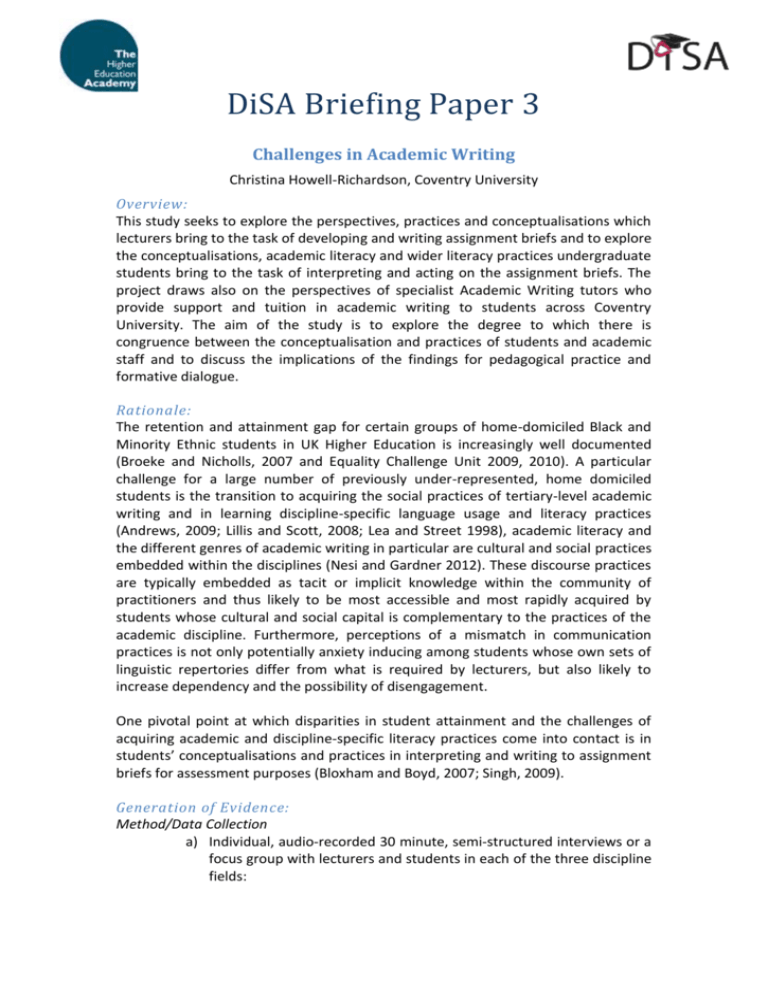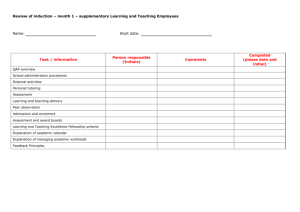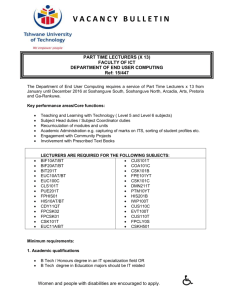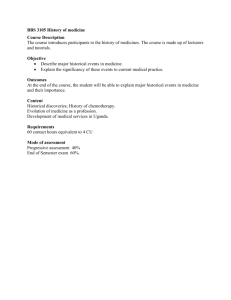Challenges in Academic Writing
advertisement

DiSA Briefing Paper 3 Challenges in Academic Writing Christina Howell-Richardson, Coventry University Overview: This study seeks to explore the perspectives, practices and conceptualisations which lecturers bring to the task of developing and writing assignment briefs and to explore the conceptualisations, academic literacy and wider literacy practices undergraduate students bring to the task of interpreting and acting on the assignment briefs. The project draws also on the perspectives of specialist Academic Writing tutors who provide support and tuition in academic writing to students across Coventry University. The aim of the study is to explore the degree to which there is congruence between the conceptualisation and practices of students and academic staff and to discuss the implications of the findings for pedagogical practice and formative dialogue. Rationale: The retention and attainment gap for certain groups of home-domiciled Black and Minority Ethnic students in UK Higher Education is increasingly well documented (Broeke and Nicholls, 2007 and Equality Challenge Unit 2009, 2010). A particular challenge for a large number of previously under-represented, home domiciled students is the transition to acquiring the social practices of tertiary-level academic writing and in learning discipline-specific language usage and literacy practices (Andrews, 2009; Lillis and Scott, 2008; Lea and Street 1998), academic literacy and the different genres of academic writing in particular are cultural and social practices embedded within the disciplines (Nesi and Gardner 2012). These discourse practices are typically embedded as tacit or implicit knowledge within the community of practitioners and thus likely to be most accessible and most rapidly acquired by students whose cultural and social capital is complementary to the practices of the academic discipline. Furthermore, perceptions of a mismatch in communication practices is not only potentially anxiety inducing among students whose own sets of linguistic repertories differ from what is required by lecturers, but also likely to increase dependency and the possibility of disengagement. One pivotal point at which disparities in student attainment and the challenges of acquiring academic and discipline-specific literacy practices come into contact is in students’ conceptualisations and practices in interpreting and writing to assignment briefs for assessment purposes (Bloxham and Boyd, 2007; Singh, 2009). Generation of Evidence: Method/Data Collection a) Individual, audio-recorded 30 minute, semi-structured interviews or a focus group with lecturers and students in each of the three discipline fields: Bio-Medical Sciences: interviews with 2 lecturers. Focus group -9 students Social Work : interviews with 2 lecturers and 6 students English Language/Creative Writing: interviews with 2 lecturers and 2 students b) Focus group- Academic Writing Tutors (9 tutors) c) Electronic survey across all discipline areas – based on GanobcsikWilliams (2004)-[ongoing- target= 20 academic staff + 50 students] With each group of respondents 4 specific sub- themes are addressed: 1. What kinds of discipline specific academic literacy practices are students expected to develop over their undergraduate years? How and when is this literacy developed? 2. What are the (implicit) criteria of a “good*” assignment for a level 2 undergraduate within the specific discipline field? [*60+ ] 3. What are students’ practices in preparing for and writing to an assignment brief? 4. What makes a good assignment brief? The following demographic data has been collected for all participants in the study (table1): Students Academic Staff Discipline area/subject Year of Study Part-time or Full-time Entry/access route to university Highest previous academic qualification Previous job/career (2 years+) Age Gender Ethnicity English as L1/ Bi-lingual/ English as a Foreign Language Discipline area/subject Length of Service Academic title/seniority Range and breadth of teaching experience Previous career Typical demographic characteristics of student population Table 1: Demographic Data- DISA: CAW project 2012 Existing Evidence The project draws on a variety of resources in assessment in higher education. The following sources have been of particular influence: Transforming the Experience of Students through Assessment (TESTA project 2009-2012) Assessment Standards Knowledge Exchange (ASKE) Oxford Brookes University Professor Sue Bloxham’s work on assessment in higher education Professor Liz McDowell’s work on Assessment for Learning in Higher Education Assessment for Learning - Black P, William D, Harrison C Research findings/ New Evidence: The analysis is in progress. The analysis will seek to explore (a) the degree of common understanding between lecturers and students conceptualisations of briefs and (b) any emergent patterns within and across the 4 core themes, attaining to specific attributes, behaviours, literacy practices or perspectives, which are/might be related to differentiation in student learning and attainment in Higher Education. Target for completion and reporting December 2012. Outcomes/implications for policy and practice: Outcome 1 - A toolkit for lecturers on the role of assignment brief design and formative dialogue in developing student academic writing. In progress- 36-38 pages: 6 sections. To be piloted and evaluated in November/December 2012. On completion a copy of the toolkit will be given to all lecturers at Coventry University. Outcome 2 - An article reporting on the study and the findings to be submitted to a refereed journal e.g. Teaching in Higher Education. References Andrews R (2009) Argumentation in Higher Education: Improving Practice through Theory and Research. London. Routledge Black P and William D (1998) Inside the black box: Raising standards through classroom assessment Department of Education and Professional Studies, King’s College, London Bloxham S and Boyd (2007) Developing Assessment in Higher Education: A practical guide. Maidenhead. OU Press/ McGraw-Hill Broeke and Nicholls (2007) Ethnicity and Degree Attainment. Department for Education and Skills Research Report RW92. Availablefrom: https://www.education.gov.uk/publications/standard/publicationDetail/Pag e1/RW92 Curry, M J and Lillis,T (2010). Making professional academic writing practices visible: Designing research-based heuristics to support English-medium text production. In: Harwood, Nigel ed. English Language Teaching Materials: Theory and Practice. Cambridge: Cambridge University Press, pp. 321–345. Equality Challenge Unit (2009) Equality in higher education: statistical report 2009. London: ECU. Equality Challenge Unit (2010) Equality in higher education: statistical report 2010. London: ECU. Ganobcsik-Williams L (2004) A Report on the Teaching of Academic Writing in UK Higher Education. Royal Literary Fund Lea M. and Street B. V.(1998). Student Writing in Higher Education: An Academic Literacies Approach Studies in Higher Education vol 23 (2) 157-172 Lillis,T. and Scott, M. (2008) (eds.) Special Issue of Journal of Applied Linguistics. New Directions in Academic Literacies. 4.1. Nesi H and Gardner S (2012) Genres across the Disciplines: Student Writing in Higher Education. Cambridge. Cambridge University Press Singh G (2009) A synthesis of research evidence. Black and minority ethnic (BME) students’ participation in higher education: improving retention and success. Available: www.heacademy.ac.uk/evidencenet








